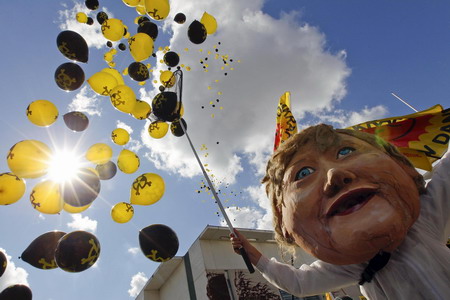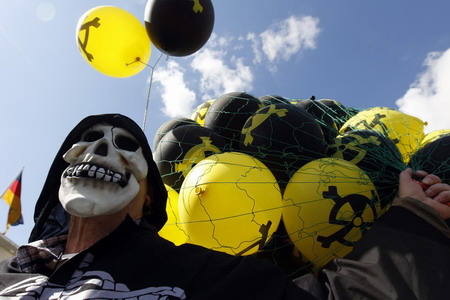Global General
German to extend life of nuclear reactors
(Agencies)
Updated: 2010-09-06 13:43
 |
Large Medium Small |
|
 A demonstrator wearing a mask with the face of German Chancellor Angela Merkel protests against nuclear energy in front of the Chancellery in Berlin September 5, 2010. [Agencies] |
BERLIN -- Chancellor Angela Merkel's coalition government agreed to a two-tier extension of the lifespans of German nuclear power plants on Sunday after marathon talks laid the groundwork on energy policy.
The agreement ended months of division in the coalition over how long Germany's 17 nuclear power plants should run beyond current limits, under which the last is due to close by 2021.
Environment Minister Norbert Roettgen said after the meeting in Berlin that the lifespans of Germany's nuclear power stations would be extended by 12 years on average.
| ||||
The debate has also pitted nuclear power plant operators against environmentalists, about 1,000 of whom staged a protest outside the chancellery where the meeting was held.
The agreement is set to be the cornerstone of Merkel's broader energy strategy which will be decided later this month.
She has invested much political capital in the strategy, which must be implemented smoothly if she is to reverse her government's slump in opinion polls in time for a string of important elections early next year.
That will not be easy as Germans are sceptical about the safety risks of nuclear power and unresolved questions about nuclear waste storage.
Environmentalists, however, will likely applaud the decision made on Sunday, as part of the deal, to steer public and private support to Germany's renewable energy industry.
Sunday's meeting also set down some of the specifics of a separate nuclear fuel element tax intended to raise 2.3 billion euros ($3.1 billion) a year.
The deal faced immediate criticism from the opposition Social Democrats, who said they planned a legal challenge if Merkel's centre-right coalition attempted to pass it into law without approval of the upper house of parliament.
Merkel plans to make a statement on Monday, and Roettgen and Economy Minister Rainer Bruederle are expected to reveal further details of the plan.
|
 A demonstrator wearing a skull mask protests against nuclear energy in front of the Chancellery in Berlin September 5, 2010. [Agencies] |



